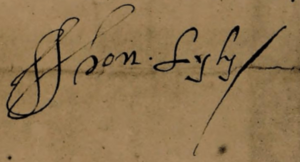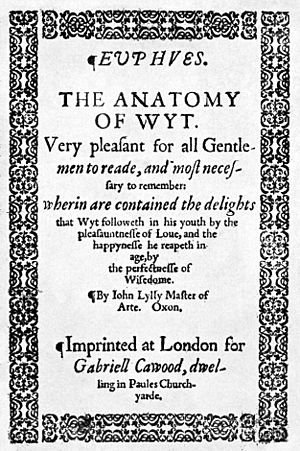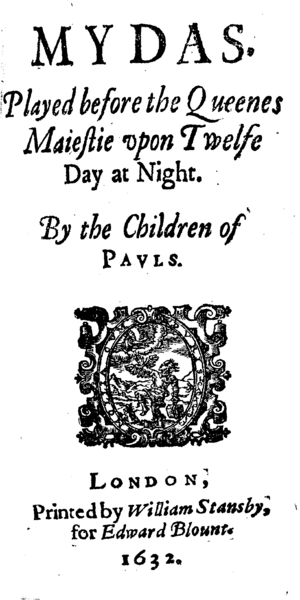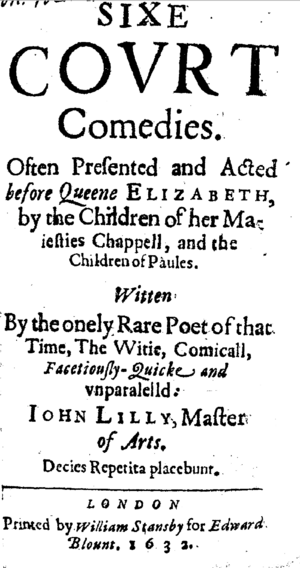John Lyly facts for kids
Quick facts for kids
John Lyly
M.A. (Oxon) & (Cantab)
|
|
|---|---|

Lyly's signature, from a letter to Sir Robert Cecil, 4 Feb. 1602-3
|
|
| Born | 1553 or 1554 Kent, England |
| Died | 30 November 1606 (age about 52) London, England |
| Resting place | St Bartholomew-the-Less, London |
| Occupation | Writer, dramatist, courtier, and Member of Parliament |
| Language | Early Modern English |
| Nationality | English |
| Alma mater | Magdalen College, Oxford |
| Literary movement | English Renaissance |
| Years active | 1578–1602 |
| Notable works |
|
| Parents | Peter Lyly and Jane Burgh |
| Relatives |
|
John Lyly (born around 1553 or 1554 – died November 1606) was an English writer, playwright, and politician. He was very famous in his time for two books: Euphues: The Anatomy of Wit (1578) and its follow-up, Euphues and His England (1580).
Today, he is best known for his eight plays. At least six of these plays were performed for Queen Elizabeth I. Lyly's special writing style, called euphuism, was named after the main character in his books. Many writers copied his style. He is sometimes called one of the 'University Wits', a group of smart writers from Oxford and Cambridge. Some people even say he wrote the first English novel and is the 'father of English comedy'.
Contents
John Lyly's Life Story
Early Life and School Days
John Lyly was born in Kent, England, around 1553 or 1554. He was the oldest son of Peter Lyly and Jane Burgh. His father was a public official, first in Rochester and later in Canterbury. John's younger brothers and sisters were born in Canterbury.
His grandfather was William Lily, a famous grammarian and the first headmaster of St Paul's School, London. His uncle, George Lily, was also a scholar.
John probably went to King's School, Canterbury, where his younger brothers also studied. His father died in October 1569 when John was about 15. John and his mother were in charge of his father's will.
In 1571, at age 16, Lyly started studying at Magdalen College, Oxford. He earned his bachelor's degree in 1573 and his master's degree in 1575. He once complained about being temporarily sent away from the university, but we don't know why or when this happened.
Even though he was known for his cleverness, Lyly was more interested in writing than in his schoolwork. A writer named Anthony Wood said that Lyly loved poetry so much that he didn't focus much on his university studies. Still, he did get his degrees.
While at Oxford, Lyly wrote to Lord Burghley, a powerful government official. He asked for help to become a fellow at Magdalen College. He didn't get the fellowship, but he stayed in touch with Lord Burghley. Lyly later wrote about how helpful Lord Burghley was to him.
Becoming a Writer and Playwright
After university, Lyly moved to London. He lived in a fancy place called the Savoy Hospital. There, he started his writing career. His first book was Euphues: The Anatomy of Wit. It was published in 1578 and became an instant hit.
He quickly wrote a second book, Euphues and his England, which came out in 1580. This book was also very popular. Together, these two books were printed over thirty times by 1630. They were called "the literary sensation of the age."
For a while, Lyly was the most popular writer in England. People said he created "a new English" way of writing. If someone at court couldn't speak in the "Euphuism" style, they weren't considered fashionable. Lyly's writing style was copied by many other writers of his time.
Lyly dedicated his second Euphues book to Edward de Vere, 17th Earl of Oxford. This Earl became Lyly's private secretary. In 1582, Lyly wrote to Lord Burghley, defending himself against a charge of dishonesty involving the Earl.
In 1583, the Earl of Oxford helped Lyly get the lease for the first Blackfriars Playhouse. Lyly's first two plays, Campaspe and Sapho and Phao, were performed there. These plays were put on by child acting groups, Oxford's Boys. They also performed for Queen Elizabeth I at Whitehall Palace.
Campaspe was performed during Christmas 1583-84. Sapho was performed in March 1584. Lyly was paid £20 for these two shows. However, he soon lost control of the theater and was even briefly put in Fleet Prison for a debt. The Queen herself helped him get out quickly.
In 1584, Lyly was still working for the Earl of Oxford. The Earl gave Lyly some land rights worth £30 a year. A year later, Lyly sold these rights for £250.
In 1587, Lyly started writing plays again for the Children of Paul's, another child acting company. His plays were first shown to the public at their playhouse near St Paul's Cathedral. Then, they were performed for the Queen.
Gallathea was likely performed for the Queen in 1587-88. Endymion followed in 1588. Midas was performed on January 6, 1590. Two other plays, Mother Bombie and Love's Metamorphosis, were also from this time. They were performed by Paul's Boys.
After Paul's Playhouse closed, Love's Metamorphosis was performed again in 1600-1601 by the Children of the Chapel. Lyly's eighth play, The Woman in the Moon, was his only play written in verse (poetry). It was published in 1597. In total, at least six of Lyly's eight plays were performed for the Queen.
In 1589, Lyly wrote a pamphlet called Pappe with an hatchet. It was part of a big argument happening at the time. Even though it was published without his name, other writers later confirmed he wrote it.
Politician and Court Member
Lyly was a Member of Parliament (M.P.) for four different areas during Queen Elizabeth's last years. He represented Hindon in 1589, Aylesbury twice (in 1593 and 1601), and Appleby in 1597-98. He also served on a committee about wine barrels.
In 1594, Lyly became an honorary member of Gray's Inn, a legal society. He attended their Christmas celebrations, where William Shakespeare's company famously performed Comedy of Errors. In 1597, Lyly wrote some Latin poems for a book by Henry Lok.
Besides plays, Lyly also created "entertainments" for Queen Elizabeth. These were special shows with music and drama, performed when the Queen traveled. The Entertainment at Chiswick was performed in 1602. Some people think Lyly also wrote other royal entertainments in the 1590s.
Lyly hoped to become the Queen's Master of the Revels, a job in charge of royal entertainment. He wrote two letters to Queen Elizabeth, saying he had been her servant for many years. He complained that he had waited for ten years, then thirteen years, but still had "nothing." He had "a thousand hopes, but all nothing; a hundred promises but yet nothing."
These letters show his disappointment. Although the original letters are lost, many copies were made and shared after Lyly's death. This shows how well-known his situation was.
In 1602, Lyly sent another letter to Sir Robert Cecil, the Queen's secretary. He mentioned that his wife had given his petition to the Queen, and she had accepted it. We don't know if he received anything from this petition. When Queen Elizabeth died in 1603, Lyly was given black cloth for her funeral, as was customary for her servants.
Lyly died in 1606 during the reign of King James I. He was buried on November 30 in St Bartholomew-the-Less church in London. He was married to Beatrice Browne and had at least nine children.
The famous saying "All is fair in love and war" is sometimes said to come from Lyly's book Euphues.
John Lyly's Plays
Even though his Euphues books were very popular, Lyly's plays are now admired more. People like how he used dramatic prose and how well-structured his plays were.
Eight of Lyly's plays still exist today. They were published during his lifetime. All but one were written in prose (regular sentences, not poetry).
- Campaspe (performed 1583/84, printed 1584, 1591)
- Sapho and Phao (performed 1584, printed 1584, 1591)
- Gallathea (performed 1587/88, printed 1592)
- Endymion, the Man in the Moon (performed 1588, printed 1591)
- Midas (performed 1589/90, printed 1592)
- Mother Bombie (performed c.1590, printed 1594, 1598)
- Love's Metamorphosis (performed c.1589/90, revived 1600/01, printed 1601)
- The Woman in the Moon (probably performed 1590-95, printed 1597)
Some plays were once thought to be Lyly's, but most experts no longer agree.
In 1632, Edward Blount published Six Court Comedies, the first collection of Lyly's plays. Blount also published Shakespeare's plays that same year. The collection included Endymion, Campaspe, Sapho and Phao, Gallathea, Midas, and Mother Bombie. The last two plays Lyly published, The Woman in the Moon and Love's Metamorphosis, were not included. This collection also printed the songs from Campaspe and Gallathea for the first time.
In his introduction, Blount explained why he published the plays. He said he wanted to "dig up the grave of a rare and excellent poet" whom Queen Elizabeth had enjoyed. He felt it would be a "sin" to let these "rare monuments of wit" be forgotten. He believed Lyly was a "darling" of the Muses (goddesses of inspiration).
Blount ended his introduction by saying that Lyly's plays brought him fame and gave pleasure to the audience. He encouraged readers to enjoy Lyly's witty plays.
Francis Meres, a writer of the time, listed "eloquent and witty John Lyly" alongside Shakespeare as one of the best comedy writers in 1598. Ben Jonson, another famous playwright, also praised Lyly in a poem about Shakespeare. He said Shakespeare outshone Lyly and other great playwrights.
Lyly's importance as a playwright has been debated. However, his dialogue was a big improvement for English theater. His quick wit and cleverness were an important step in how plays were written. Many of Shakespeare's comedies, like Love's Labour's Lost, A Midsummer Night’s Dream, Much Ado About Nothing, As You Like It, and Twelfth Night, were influenced by Lyly's work.
See also
 In Spanish: John Lyly para niños
In Spanish: John Lyly para niños
 | Selma Burke |
 | Pauline Powell Burns |
 | Frederick J. Brown |
 | Robert Blackburn |




